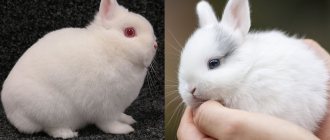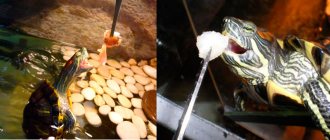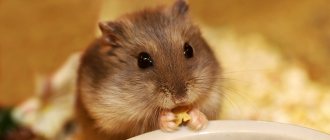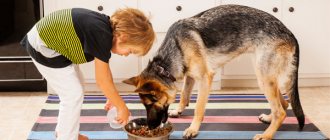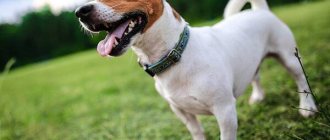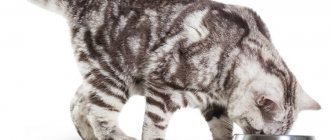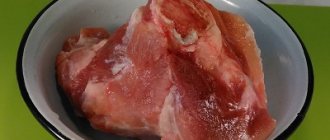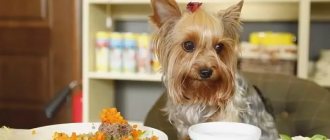A well-thought-out diet containing vitamins and microelements guarantees good physical condition and a long life. But many, having brought this baby home, wonder: what to feed a dachshund puppy?
The first step is to choose food for your dachshund puppy. Most owners choose food only for convenience, buying any food in the first supermarket they come across. But the food is designed primarily for the comfort of the owners; all that is necessary is to name the desired dose on the plate. Moreover, the manufacturers of their pet products take into account all the needs of four-legged friends with different tastes. Some owners do not trust dry food at all and prefer feeding with natural food, but frivolously put in everything they themselves eat.
The most effective nutrition in a new place will be what the breeder recommends. This will turn off the possibility of allergies and adapt to an unfamiliar environment as quickly as possible. When you have decided on food, only then slowly retrain your dog for another food. The transition should be smooth. In this case, the old food must be replaced with another. Of course, mixing old and new food is not recommended.
Dachshund nutritional features
The dachshund is a hunting breed whose diet relies on meat. Now these are just lap dogs, but they still need a diet in which the proportion of high-quality animal food will be greater than plant food, which the dog’s stomach does not digest well. This is the main condition for proper nutrition of dogs. If this is observed, it is easier to decide whether to feed your dachshund dry or natural. Natural food usually inspires more confidence among owners, but requires counting the amount of nutrients, calories, portion size, and preparation time. The industrial diet is already balanced and easy to use.
Prohibited Products
There is a whole list of prohibited foods that every animal lover who wants to know what is best to feed a dachshund should familiarize themselves with:
- Chocolate. May cause poisoning to your pet.
- Tubular bones. They negatively affect the condition of the intestines and stomach, can cause constipation, and also cause toothache. When split, they form sharp corners that damage the walls of the digestive tract.
- Sausages, sausages and other smoked meats. They have a detrimental effect on the condition of the liver and can provoke the development of cirrhosis. Saltpeter, which is part of their composition, is a slow poison. For a person it is not noticeable, but for a dog it is quite noticeable.
- Onion garlic. They corrode the walls of the stomach, and there is a high probability of ulcers.
- Fried or salty foods.
- Spoiled products.
Feeding dry food
Complete dry food from a proven brand is enough to properly feed your dachshund - with it the dog receives everything it needs for growth and development. Do not add vitamins or minerals to your dog’s prepared diet to avoid causing an overdose.
Single portions of “drying” for a dachshund are usually small: the more digestible the food, the smaller. So, a dachshund needs economy class food ~400 g per day, super premium, holistic food - ~40-180 g (the exact amount depends on weight and activity). In the dog's stomach it increases in volume and swells due to water. Don't worry about your pet going hungry by following the manufacturer's recommendations. Remember, the Dachshund is a dog with a good appetite and will gain excess weight if overfed.
How to choose dry food?
Choose premium food or higher for your dachshund, designed for small breeds. Meat and healthy offal (liver, heart) are first on the list. The protein included in the dry diet of an adult dachshund must be at least 22% (meat 40% and above); the amount of other nutrients depends on this figure. A good “drying” should contain little fat and carbohydrates, which cheap foods cannot “boast” of.
Royal Canin Dachshund for dachshunds over 10 months
Premium food. Takes into account the breed characteristics of adult dachshunds: high need for protein to maintain activity and muscle tone, congenital chondrodystrophy and increased load on the spine, jaw structure and grip method, tendency to obesity.
Profine Adult Small Chicken&Potatoes
Czech super-premium food with chicken (45%), corn, potatoes and seafood. Suitable for regulating dachshund weight, preventing joint diseases. Although it is not holistic, it does contain fruit (dried apple) and herbs (basil, sage, fennel).
Wellness Core Healthy Weight grain-free for small breeds
Low-calorie, vitamin- and protein-enriched holistic food with turkey and chicken. The carbohydrate component is potatoes, the vitamin component is apples, carrots, spinach, broccoli, cranberries, blueberries, tomatoes. Suitable for weight regulation, supporting dog joints.
When should you change food?
Food from different brands, but of the same class, does not differ much. Only the dog’s individual preferences and medical indications matter. If the dachshund refuses the offered food or is allergic to it (“the eyes or ears get wet, the hair falls out not during shedding, the dog scratches the skin”), then replace the food or remove allergenic foods (fish, baked goods, fermented milk, smoked meats).
But only if the reason is this, and not parasites or improper maintenance! Offer your pet a trial amount of a different brand of food. If he eats and everything is fine with health, switch to it within 2-3 weeks. Also gradually change “drying” to natural feeding. Monitor your dog and its health.
If you overfed your dog
Keep in mind that this breed especially should not be overweight because it has short legs and will not be able to move easily. This harms stable heart muscle. When your pet has gained unnecessary weight, then it is better to put him on a diet, give him low-fat food and less food. For example, you can give kefir in the morning, 3 tablespoons of meat for lunch, and stewed vegetables in the evening.
If you feed your dog one food, then you need to replace it with less fat content. Physical activity and long walks will also help you lose weight.
It is also important not to miss the point that a small pet constantly wants to chew on something, and these can be completely different objects. Therefore, it is better to keep an eye on what the puppy is trying to eat. Foreign objects will harm the digestive system. When you notice that your pet is chewing on pieces of furniture or slippers, it is better to immediately punish the puppy, teaching him discipline.
Natural diet
should contain different foods - sources of protein, fats, carbohydrates, vitamins and minerals. Follow this rule and do not try to greatly diversify your dog’s diet.
Suitable:
- stringy meat (chicken (if there is no allergy), turkey, lamb without fat, beef - in large pieces);
- sea fish, boneless, scalded;
- cereal porridge in water or broth (rice, buckwheat), steamed rolled oats;
- vegetables and fruits (raw, grated or put through a blender, with the exception of cabbage, stew it);
- low-fat fermented milk products (yogurt, cottage cheese; cheese - as a reward);
- tendon bones (clean teeth, strengthen jaw);
- eggs (boiled or raw yolk).
Sample menu for the week
| Day of the week | Morning | Evening |
| Monday | Raw rabbit meat, cereal in milk, grated raw carrots. | Raw beef, cereal, grated raw zucchini and vitamins. |
| Tuesday | Lean lamb, half a glass of fermented baked milk, grated apple, porridge. | Boiled liver, rice porridge, boiled chopped pumpkin, finely chopped greens. |
| Wednesday | Boiled fish (pollock), rice porridge, boiled cauliflower, chicken yolk. | Raw or cooked beef, vegetables and porridge. |
| Thursday | Raw beef tripe, rice porridge, stewed cauliflower, grated pear, organic yogurt. | Low-fat cottage cheese with vitamins, grated cucumber and millet crackers. |
| Friday | Raw chicken hearts, semolina porridge, tomato and juice. | Raw sprat, buckwheat, stewed zucchini and greens. |
| Saturday | Beef, boiled pink salmon, oatmeal, grated walnuts, stewed cabbage with tomatoes. | Ryazhenka, beef biscuits and beef bone. |
| Sunday | Raw chicken breast, porridge, greens and apple. | Raw rabbit, porridge, grated pumpkin and greens. |
What not to feed
- pork and other fatty meats (causes vomiting and diarrhea),
- fatty (butter, margarine, fried),
- chicken skin (allergenic),
- pearl barley, semolina, legumes (not digestible), millet (causes diarrhea),
- bones (the intestines are injured, clogged);
- potatoes (exclude or give in small quantities: dachshunds hardly digest starch),
- sweet, salty, hot, spicy, smoked foods (spoils digestion, teeth, detracts from the sense of smell),
- sweet products.
What to give up
The dachshund's digestive system is quite sensitive. Food must be impeccably fresh; stale food can cause poisoning. Some products are strictly prohibited.
Dachshunds exclude fried, floury, spicy and other foods that are harmful to dogs from their diet.
The stop list includes:
- smoked meats and sausages;
- freshwater fish with bones;
- lamb, pork, raw chicken;
- onions, potatoes;
- whole milk;
- oatmeal, bread, pastries;
- chocolate, cookies and other sweets;
- Exotic fruits;
- purchased minced meat;
Adult dachshunds should not be fed food that is pureed or too finely chopped. Meat pieces should be small and easy to swallow. Dogs of this breed are prone to stomach upsets and food allergies. If vomiting or diarrhea occurs, you will have to reconsider your diet and eliminate provoking foods.
What to feed a puppy
Find out from the breeder what food your puppy is accustomed to, and feed him the same for a week or two. This will avoid possible digestive disorders and allergies. The frequency of feeding a baby dachshund depends on its age.
| Age, months | Feeding frequency, once a day | What to feed |
| up to 1 | ~10-12 (every 2 hours) | mother's milk, sour milk, meat broths at room temperature |
| 1-2 | 5-6 | + semi-liquid porridge and pureed vegetables |
| 2-3 | 4 | + cereal soups with vegetables, boiled meat |
| 3-5 | 3-4 | + little by little raw meat, boiled offal, exclude pure milk |
| 3-8 | 3 | gradual transition to an adult diet |
| after 8 | 2 | like an adult dog |
Dachshund puppies go through periods of increased growth during which they need an “adult” portion of food. This is fine. Focus on the puppy's fatness: he should not have noticeable ribs. Underfeeding babies is more dangerous for their health than overfeeding! Malnutrition will not turn him into a dwarf breed, but will make him sick, with a lack of bone mass. But the height will still be the same as that of his parents.
The dachshund puppy wants to go to the toilet immediately after eating, so you need to walk him after feeding, but do not let him run actively.
Some owners advise small puppies to be given meat food for children. But you can also do it yourself by grinding boiled meat in a blender and adding a little porridge. Be sure to give your puppy milk and dairy products up to 3 months, which will provide calcium to his growing skeleton.
Here's an expert's opinion on proper dog nutrition.
Feeding a puppy under 2 months of age
Before the age of one month, you should be careful.
For the first three weeks, the baby drinks only mother's milk. This strengthens the immune system and allows the body to become stronger. Starting from three weeks, you should gradually retrain the dog to a new diet. For up to a month, your puppy can be given fermented milk products, meat baby food, thin semolina or rice semolina porridge at home. After a month, the baby is already allowed to feed vegetables. Eating carrots will be beneficial, so you can make soup from it or just give it raw. This will also be an additional toy that can protect furniture and shoes from bite marks. It is also possible to bait with rice and semolina milk porridges.
When the puppy is already 2 months old, he needs to expand his food intake. It is already allowed to give boiled meat. For example, chicken, turkey, veal are suitable. Pork is not recommended in the diet, as it is very fatty. You cannot feed your pet meat all the time; once a week will be enough. Once every half month you can have a beaten egg. Although it is not recommended to do this before bed, since heavy food takes a long time to digest. Poor absorption can be determined by the dog's stool. If it is watery, it means that some new product is poorly absorbed, and you should avoid it for now.
The main thing in this matter is not to overdo it, and introduce everything little by little and gradually.
How and what to feed an adult dachshund
Feed your Dachshund twice a day, morning and evening. A one-time amount of “natural food” is calculated using the formula 40 g * x kg, where x is the weight of the dog. If your dog’s “hungry” look forced you to give him a daytime snack, give him a smaller portion in the evening. But it’s better not to disrupt the feeding schedule. This is the only way the dachshund will not beg and steal food.
Let adult dogs eat after a walk, so as not to provoke intestinal volvulus. Cook meat, grains and vegetables separately from each other, and mix in a bowl before serving. Don’t forget about clean drinking water: the dog should have plenty of it at any time of the day and year (especially in the summer heat). It is not advisable to combine nutrition systems (ready-made and natural).
Here is a detailed example of feeding from their owner.
Vitamins for dachshunds
Dachshunds are often deficient in phosphorus and calcium, and their skeletal features require active joint protective supplements (glucosamine). Proven complexes for dachshunds:
8in1 Excel Calcium (Calcidee)
Based on the balance of phosphorus, calcium and vitamin D, it combines well with other complexes, in some cases it is recommended to be fed along with dry food. Suitable for puppies, pregnant and lactating bitches.
8in1 Pervinal Excel Puppy Multi Vitamin
A complete complex of 12 vitamins and 10 minerals, suitable for rapidly growing dogs.
8in1 Excel Glucosamine
Chondroprotector, contains glucosamine and chondroitin, which protects the cartilage of the intervertebral joints, as well as the joints of the limbs, from destruction.
Feeding pregnant and lactating bitches
Give puppy and lactating bitches more food from about the second half of pregnancy so that they do not have a deficiency of nutrients, vitamins and microelements. Then increase the frequency of feeding to 4 times a day and maintain the entire period of whelping and feeding the puppies - ~2 months, but no longer. After giving birth, be sure to make sure mommy gets enough minerals, especially calcium, to avoid postpartum eclampsia. After weaning the puppies, the bitch may seem thin - fatten her up a little, but don’t get carried away, and later switch her to super premium and holistic class diet food.
What food to feed a dachshund with health problems
- Obesity: if it is not diabetes or thyroid disease, put your pet on a low-calorie natural diet (meat, vegetables and dairy) or a ready-made diet for overweight dogs.
- Allergies: hypoallergenic lines of industrial feed are suitable; or choose those natural products to which your pet will not have a reaction.
- Gastritis: easily digestible foods (chicken), steamed, slimy soups and porridges or food for dogs with sensitive digestion.
What is strictly contraindicated
Despite the fact that there are prohibited foods, there is also a list of what dachshunds are strictly contraindicated from eating.:
- Sausage product. They contain saltpeter, which will cause cancer in your pet.
- Chocolate. The dog can be poisoned by it.
- Rabbit and chicken bones. They are essentially tubular, which means they can injure a dog’s mouth with a splinter.
- Fried and smoked food. Such food can have a negative effect on the human body, let alone dogs.

